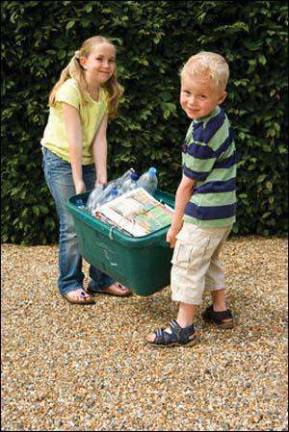Eco-parenting: How to instill earth-friendly habits in kids

Newton Many schools are addressing the issue of environmental awareness through various learning activities, but it all begins at home. Send the kids to school with a waste-free lunch kit, which not only prevents disposable products from ending up in landfills, but could save you about $450 that would otherwise be spent on plastic wrap and baggies. Equip your kids with a reusable stainless steel water bottle. You could save $1,500 on bottles of water, which not only fill landfills with tons of unrecycled bottles each year, but can actually leach chemicals into your child’s drinks. Parents’ actions and attitudes toward the environment have tremendous influence on the behaviors of our children. No matter where you are in your own green journey, eco-parenting is simple parenting if you stick to the fundamental three Rs: Reduce, Reuse and Recycle and add in some Recreation. From that premise, you can easily incorporate eco-practices into everyday actions. Reduce Turning off lights, unplugging video games or turning off the faucet while brushing your teeth are simple habits that really add up. To increase your water conservation at the bathroom sink, install a faucet aerator, which can turn a 2.5 gallon per minute faucet into a .5 gallon per minute faucet. Keep track of your savings, and use the money for a fun family activity. And when it comes to the shower, many kids can spend 20 minutes in there and still not come out clean. To save energy and water, put a 5-minute shower timer in the bathroom and see if they can still pass mom’s inspection. Reuse Instead of buying books, use the local library, which is a great resource for learning about plants, animals and the environment. Your kids can better understand the concepts of sustainability and reusability if they learn to give items to others to reuse, and if they use items that come second-hand. To that end, start a clothing, toy or book swap with a friend or neighbor. Recycle Help your kids turn trash into treasure. Organize a neighborhood or park clean-up and take all the bottles and cans to the local recycling center. Let the kids keep any money they earn. Around the house, use bottle caps, magazines, or tin cans for art projects or to create homemade toys. Have older kids take apart a small broken appliance and make something new. For Recreation Take the kids to a farmer’s market where they can explore seasonal and sometimes quite novel produce. By supporting local farmers, you lower the carbon footprint of produce being shipped from out of state or out of country, plus you get the nutrient-loaded benefits that come with fresh-picked produce. The act of planting a garden with your child will result in many benefits. Whether it’s a full organic vegetable garden, or just a few peppers and tomatoes in containers, involve kids in planning, planting, tending and cooking and you’ll make a complete journey from garden to plate. Let the kids collect the food scraps, create compost, and complete the natural cycle. In recent years, composting has evolved from the chicken-wire wrapped pile of leaves in the back yard to under-the-sink, odor-free, worm-free models that can become a learning tool (and a fun responsibility) for children. While turning on the TV may seem to be the antithesis of green, sometimes circumstances call for a family movie night. Select a film with an environmental message such as Happy Feet, Hoot, March of the Penguins or Wall-e, and then discuss it afterward. Bring the message home by banishing one-use batteries from the TV remotes. But don’t stop there.eco- Switch all of your battery-operated devices to rechargeable batteries to save hundreds of pounds of toxic waste from entering landfills, and to save you thousands of dollars over time. There is an old Kenyan proverb that states: Treat the Earth well. It was not given to you by your parents. It was loaned to you by your children. The best way for us to protect the world they will inherit is to teach them how to care for it while they are young. Habits they learn at an early age will stay with them for lifeand, hopefully, will be passed on to their own children. For more information, visit www.greenirene.com/skylandsgreenteam. Contributed by Newton-based Green Irene Eco-Consultant, Lynn Groves Lussier.